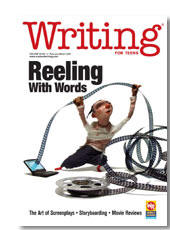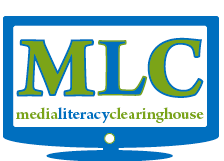Scriptwriting In The Classroom
©2006 Frank Baker, Media Educator

Special thanks to the Association for Media Literacy in Canada for recognizing this webpage as one of its recommended Internet Sites for Teaching and Learning About Media Literacy.
Resources for teachers who want to introduce scriptwriting into the English/Language Arts Classroom
Key Quotes
“Writing in a digital age is where every person is a moviemaker. Every person can put a script together [and] have images to go with it.” Writing, Learning and Leading in The Digital Age
“If video is how we are communicating and persuading in this new century, why aren’t more students writing screenplays as part of their schoolwork?” Heidi Hayes Jacobs, Educational Consultant
“It is illogical…to treat media narratives as though they are completely unrelated to school literacy. TV shows are, after all, usually written. They are built on scripts that include characterization, plot, dialogue, and often humor–the every elements that we want our students to include in the stories they write.” Thomas Newkirk (Media & Literacy)
“Scriptwriting is taking an idea and making it into a story that will be realized in action and dialogue. Simple as that.” “Script–lights, action! Reaching a young audience. “Australian Screen Education 40 (Autumn 2005)
Introduction:
What do we want students to know about scripts, scriptwriting, and screenplays? To begin with, most media (advertising, newscasts, billboards, TV, Radio, movies) start as writing. Before an inch of video or film is shot, before an ad is designed, someone has written it down on paper (or on the web.)
Secondly, those who use scripts use various techniques. Student should be encouraged to identify these techniques and discuss their effectiveness, strengths and weaknesses. Also, writers use certain
codes and conventions in their scripts. Students should become
familiar with these.
Learning to write a script opens the door to a process that many students have never been exposed to. Explaining the scriptwriting process is another way of engaging them with media, something they are most comfortable with.
To begin, I suggest teachers write the words AUDIO and VIDEO on the board or on an overhead transparency. Ask your students to define each word. Explain that scriptwriters use formats which will vary depending on their purpose. The script for a commercial, for example, will look vastly different from that of a script for news or a movie. Ask your students to compare and contrast scripts.
Explore the resources by clicking the links in the left hand column.
Timely Resources:

Weekly Reader’s WRITING magazine (February-March 2007) themed issue Reeling with Words: Screenplays, home movies, and film reviews–we show students what it takes to write for and about the movies. Resources
Share This Page:


